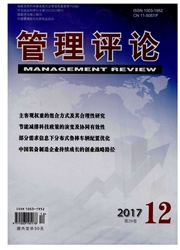

 中文摘要:
中文摘要:
论文基于社会网络理论,将两个网络结构变量——网络密度和网络中心性,引入渠道权力理论之中.在B2B渠道背景中检验了经销商群体的网络密度和经销商的网络中心性.对制造商渠道权力应用与冲突、合作之间关系的调节作用。实证研究发现:第一,网络密度会强化制造商强制性权力使用与合作之间的负相关关系和制造商非强制性权力使用与合作之间的正相关关系。第二.网络中心性会弱化制造商强制性权力使用与冲突之间的正相关关系和制造商非强制性权力使用与冲突之间的关系。第三,网络中心性对制造商强制性权力使用与合作之间的负相关关系和非强制性权力应用与合作之间的正相关关系有显著正向调节作用。
 英文摘要:
英文摘要:
Based on the Social Network Theory, this paper introduces two network structure constructs, i.e., network density and centrality to the channel power research and tests the moderating role of these constructs on the relationships between channel power exercises and conflict and cooperation in the B2B channel context. The empirical research findings show that: network density strengthens the negative relationship between coercive power exercise and cooperation and the positive relationship between noncoercive power exercise and cooperation; centrality negatively moderates the positive relationship between coercive power exercise and conflict and the relationship between noncoercive power exercise and conflict; centrality positively moderates the negative relationship between coercive power exercise and cooperation and the positive relationship between noneoercive power exercise and cooperation. The paper expands the research of channel power and explores the expanding path from dyadic analysis to the network analysis.
 同期刊论文项目
同期刊论文项目
 同项目期刊论文
同项目期刊论文
 期刊信息
期刊信息
